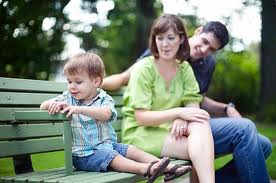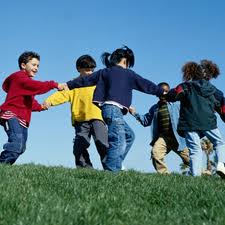Only Children Are FAR From Being Lonely
LONELY Only Child-NO Way!








OH, POOR, POOR CHILD-He/She Has NO SIBLINGS
This hub is in response to the request, IS AN ONLY CHILD ALWAYS A LONELY CHILD? by fellow hubber, Jon Smith.
I. Only Children, Often the MOST Misunderstood and Maligned of All Birth Orders
The only child is oftentimes the most maligned of all the birth order groups. In addition to that, it is also the most enigmatic and misunderstood. People just cannot fathom the only child. He/she is viewed as an anathema in this sibling society where having brothers and sisters is viewed as acceptable and applauded. People with siblings have always been viewed as superior while only children were viewed very disfavorably.
Until recently, there were more negatives than positives regarding being an only child. He/she was viewed as maladjusted, selfish, spoiled, and socially inept. According to the societal consensus, people who were only children were destined for an incomplete life throughout their childhoods until their old age. The only child was seen as a half person compared to the child with siblings who was deemed to be complete.
II. Only Children are Viewed as Unhappy and Lonely
Many people furthermore stereotyped the only child as an unhappy and lonely child. They maintain that no child is happy unless he/she has siblings. There are people who strongly assert that the worst thing parents could do is to have only one child. To these people, parents who have 1 child are the utmost in cruelty and heartlessness. In the former estimation, how could the latter not provide a sibling to their child to keep them company.
Many people believe in the atavistic premise that only children must be lonely because they have no siblings. There are even some parents of only children who subconsiously believe that their child are lonely because they are "bereft" of a sibling. There have been countless studies that people have 2 children for the purpose that their 1st child would not be an only child. It is as being an only child is an abnormality and/or disease to be avoided when possible. Sadly, despite the growing population and gradual acceptance of only children, there is still an underlying prejudice against the only child population.
III. Studies No Longer Conclude that Only Children are Lonely; However, Negative Stereotypes Still Persist That Only Children are Indeed Lonely
Yes, there are many people who take quite a dim and dismal view of only children. They maintain that because they have no siblings, they are lonely child. In the past, many educators and psychologists portend that only children were lacking in that they do not know what other children were like. They added that loneliness is second nature in the lives of only children.
Many 1-child families brought into the psychological jargon that only children were lonely. So they enrolled their children into every conceivable activity there was in order for their child not to be lonely and to be more social. There were other 1-child families who believe that by virtue of their respective child's onliness, he/she is not exactly normal so they enroll him/her into a conglomeration of activities so he/she will "less only" and more like other children.
III. ALONE is not LONELY
There are parents, particularly those who grew up in multichild families, who really do not understand the mechanism of their only child at all. They inflect their sibling psychology and modus operandi unto their only child. They cannot understand that their only child is happy being alone. They feel that being alone is equated to loneliness or worse. They believe that it is not in the natural order of things for a child to be alone. They are of the school that a child must constantly being around other children to be happy.
Besides parents, there are relatives who are quite nonplussed regarding the mechanisms and psychology of the only child. They cannot comprehend the fact that only children are quite content being alone, rather it is playing or pursuing intellectual pursuits. They consider such behavior to be socially aberrant at best and/or deviant in the worse. I remember as a child when I visited my maternal grandparents in South Carolina, I was joyfully playing in the yard. One of my maternal aunts,who was from a large family, stated quite derisively that something must be amiss with me as I enjoyed my own company. People with siblings find it indeed strange for a child to play alone. It is de rigueur in a multichild family household for children to function in a crowd setting.
IV. Only Children Use Being Alone to Develop Creativity, Independence and Resourcefulness; They Also Learn to Appreciate Their Own Company
This alone time for only child helps them develop an appreciation for their own company. They are the ones who could entertain themselves. These are the children who can play contently for hours on end without constantly asking the adults around them what should they do. They also develop imagination and independence. Charlize Theron,an only child and noted actress and producer, asserted that as a child in South Africa, she would be imaginative and play games for hours on end. Only children are not fearful of being alone like children from multichild families are.
Also only children use their alone time reading and pursuing creative and intellectual hobbies. Only children have this advantage over children who have siblings. They judiciously use their alone time to be creative and imaginative. They have more time to read and to pursue their hobbies as they have no interruptions from siblings. Furthermore, in 1-child households, there is more emphasis on educational and intellectual development. This is because only children grow up in an adult environment where the primary interactors are parents. Besides that, parents have more time to devote to teaching an only child. They also have the extensive education and experience to impart a higher and more intellectual level of such to their only child. These solitary, often intellectual activities, on the part of only child explains why they are high academic achievers in comparison to their counterparts in multichild families.
In multichid environments, there is less emphasis on intellectual attainment. Children in such families view intellectual exercise is a necessity and a barely tolerable burden. In other words, children in multichild environment partake in intellectual activities when it is related to school and seldom beyond that. They are into more extroverted activities such as athletics and related activities.
V. Only Children Have Companions-Parents, Friends, and Cousins
Only children have companionship also. It may not be siblings. They have their parents to constantly interact and play with. Only children have a rapport with their parents that children from multichild families do not have. It is not unusual for a parents to be friends and playmates as well as being parents to their only child. It is commonplace for only children to play sports and indulge in other activities with their parents. In multichild famililes, such is not often the case. Parents often do not play with their children in such families, leaving the children to play with each other. Only children have unlimited access to their parents that other children do not simply have.
Besides parents as companions, only children have cousins. Cousins are considered to be siblings albeit the OTHER siblings. Many only children remember fondly the relationship they have with their cousins, whether it is playing, discussion, and/or other activities. I constantly played and interacted with my maternal cousins, especially my older cousins.
There are also friends. Friends provide a rich tapestry of companionship. Many only children have friends from childhood. Many of these friends are as close as siblings without the hassle, hostility, and rivalry. Friends also accept them as they are without prior conditions. Many parents of only children invited their children's friends on trips and to participate in activities with them, whether it is going to a movie or to an amusement park.
Another way only children have companionships is meeting and interacting with other children through a myriad of cultural and intellectual activities. It is through such activities that they meet children from varied cultural and social backgrounds. That is an education in itself. That explains why only children particularly have a more cosmopolitan view of life. Furthermore, only children, because they have no siblings, are more likely to reach out to other children thus developing consummate social skills. To say that an only child is a lonely child is a total falsehood and totally unfounded in reality.
Conclusion
Many people staunchly insist that only children are lonely because they have no siblings to interact with. However, such is not the case. Only children constantly interact with their parents, friends, relatives, and other children. They also participate in activities where they met children from various backgrounds thus gaining a wider social perspective.
In addition to that, only children are quite comfortable being alone. They view this as a time to read and indulge in their myriad hobbies. Furthermore, being alone to an only child does not mean that they are lonely. They are quite comfortable in their own skin and can entertain themselves nicely, thank you very much. It is the sibling population who maintains that only children are lonely but in actuality, such notions are often devoid of fact and reality.
Lonely Only?
Do you believe that only children are lonely because they have no siblings
© 2013 Grace Marguerite Williams








